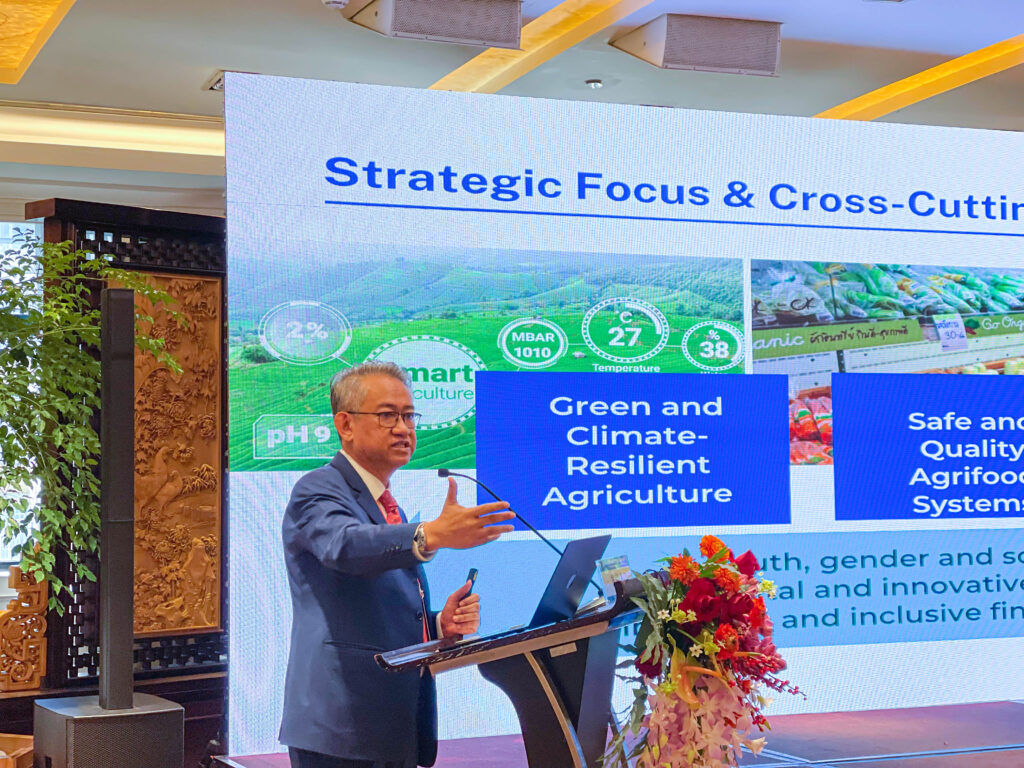Kunming, China – The Mekong Institute (MI) showed its steadfast commitment to transforming agrifood systems in the Greater Mekong Subregion (GMS) during the 3rd GMS Agriculture Ministers’ Meeting (GMS AMM-3) held from November 19-22 in Kunming, China. MI, represented by its Executive Director, Mr. Suriyan Vichitlekarn, actively contributed to key discussions aimed at fostering sustainable, inclusive and resilient agricultural systems in the subregion.
Advancing Collaboration at the Development Partners’ Roundtable
On November 20, Mr. Suriyan addressed the Development Partners’ Roundtable, a forum designed to enhance collaboration, align priorities and identify synergies among stakeholders. In his speech, he commended GMS countries, the Asian Development Bank (ADB) and development partners for their achievements in implementing the Sustainable Agriculture and Food Security Program.
“GMS agriculture has made significant progress in addressing the needs and challenges of farmers and agrifood system stakeholders. However, much remains to be done,” he stated.
Highlighting MI’s role as an intergovernmental organization established and owned by GMS countries for human resource development, Mr. Suriyan underscored MI’s mandate to translate policies into actionable solutions. He stressed the importance of partnerships for scale, results and impact, while advocating for the Working Group in Agriculture (WGA) as the main platform for collaboration among GMS governments, development partners and knowledge networks. He highlighted MI’s contribution in the development and finalization of the GMS 2030 Kunming Strategic Framework for Transforming Agrifood Systems (GMS 2030 KSFTAS).
“MI is honored to have contributed in shaping this landmark document, drawing from our extensive experience in capacity development and regional cooperation,” he said. Mr. Suriyan emphasized that the framework embodies the shared priorities of GMS countries, providing a clear roadmap for transforming the agrifood systems in the region.
Commitment to the GMS 2030 KSFTAS
Mr. Suriyan expressed MI’s support for the GMS 2030 KSFTAS, which was adopted during the GMS Agriculture Ministers’ Meeting on November 22, 2024. At the meeting, he noted that MI’s strategic focus aligns with the framework’s objectives and measures, zooming into its potential to guide sustainable development across the subregion.
“In transforming agrifood systems, transformation is also needed in our partnerships,” he remarked. He added that MI is committed to contributing to the implementation of the framework by:
- Aligning the MI’s new Strategic Plan 2026-2030 to the GMS 2030 KSFTAS;
- Leading the Knowledge Innovation and Digitalization (KID) Initiative, which interconnects key sectors such as agriculture, cross-border trade and energy;
- Building synergies between GMS and ASEAN climate-resilient agriculture programs through MI’s role as interim Secretariat of the ASEAN Climate Resilience Network; and
- Strengthening linkages with Mekong Plus One cooperation mechanisms, including partnerships with Australia, Japan and Republic of Korea.
The meeting was a milestone in regional cooperation and underscored MI’s role in shaping the future of agrifood systems in the GMS.








